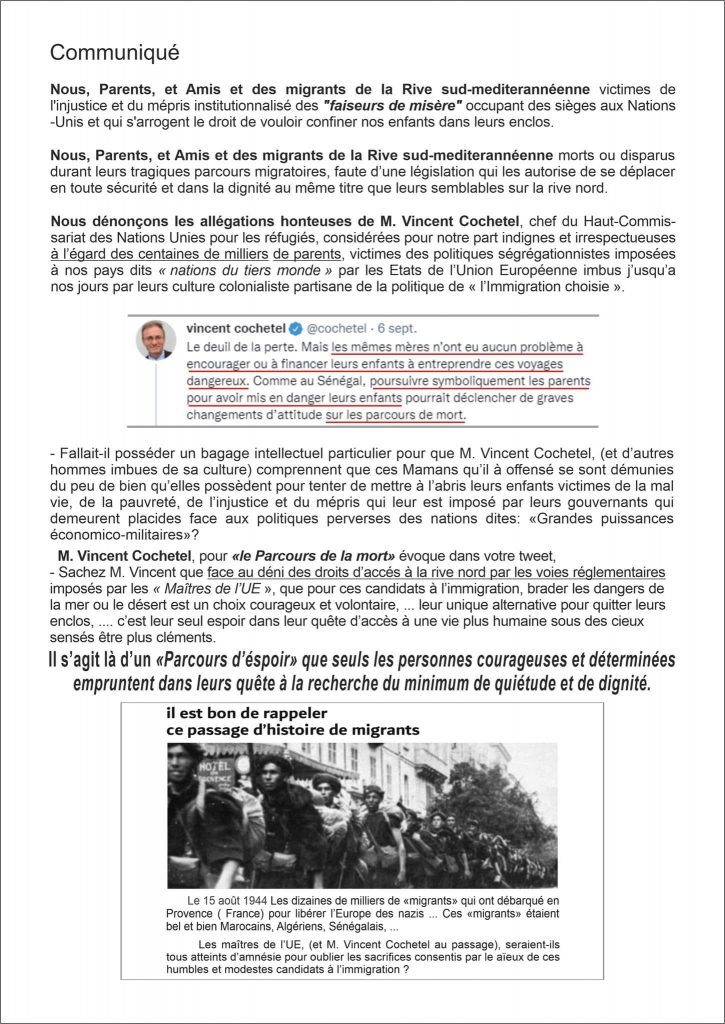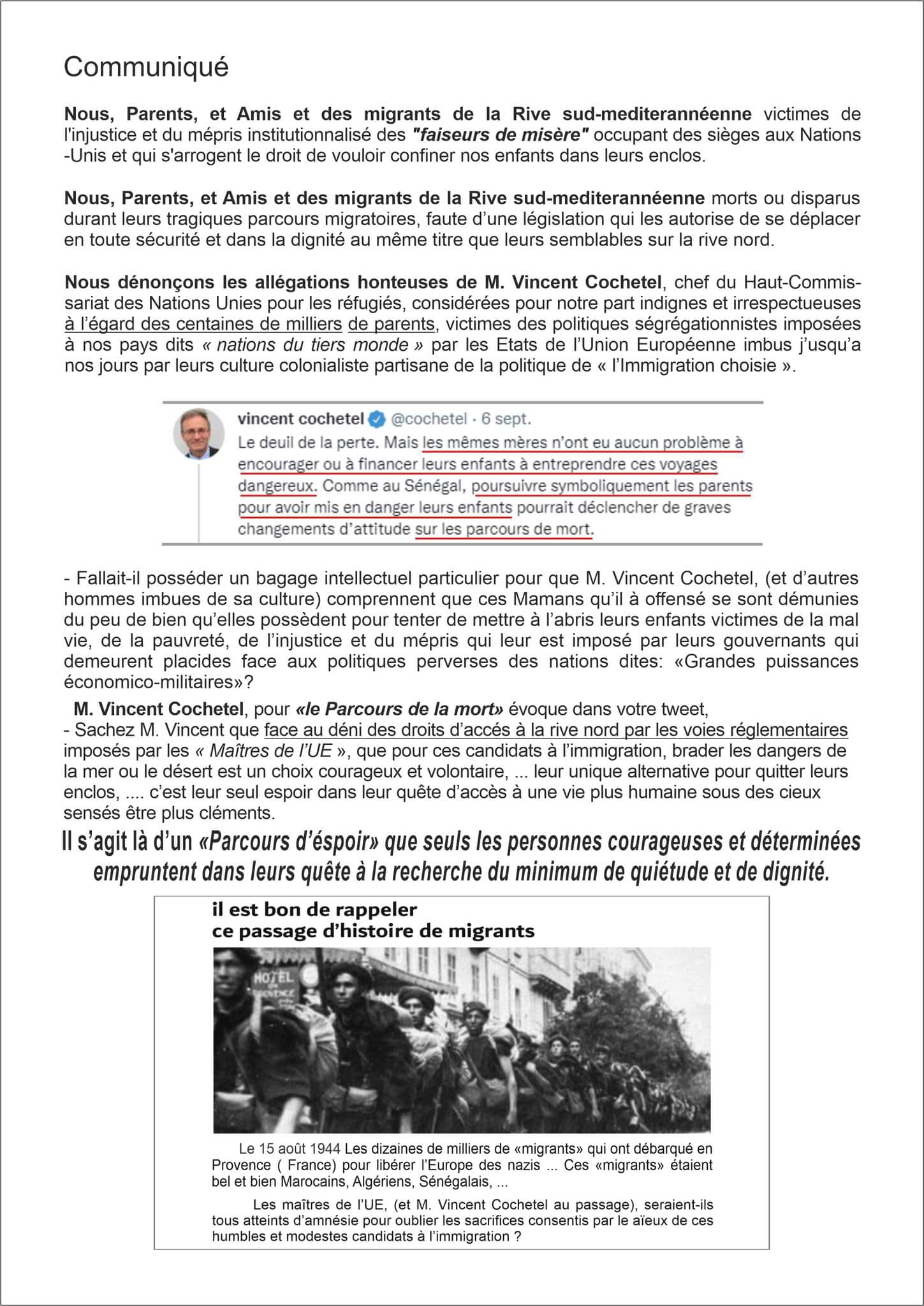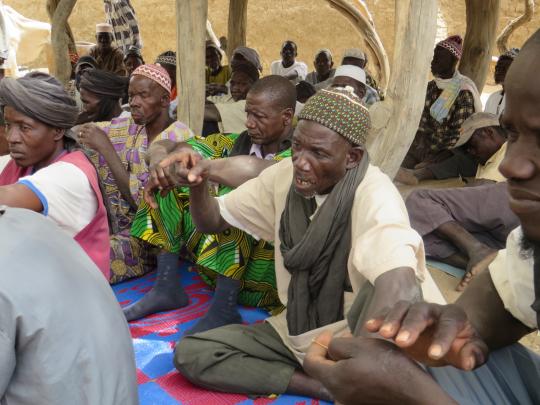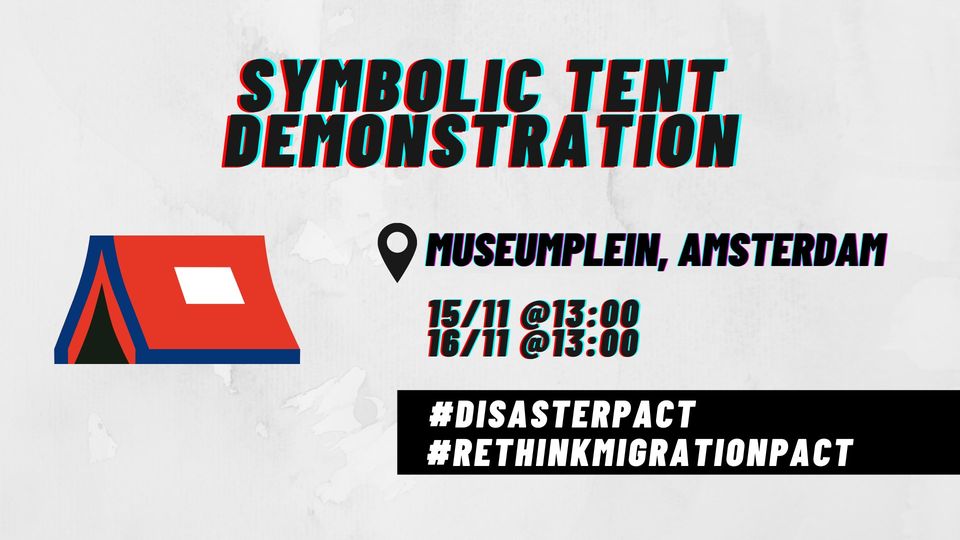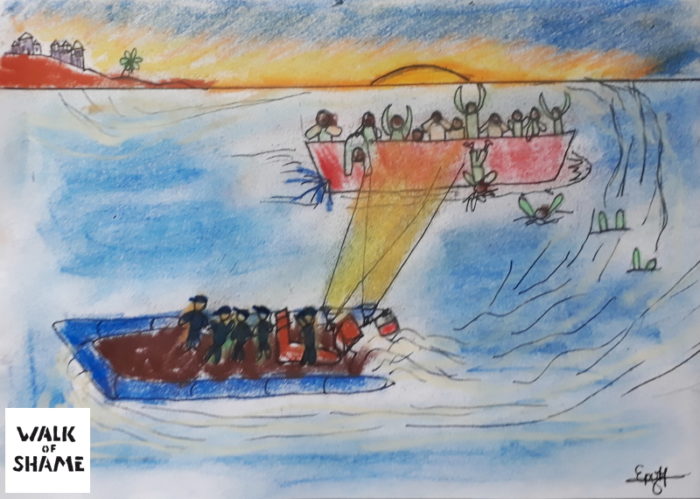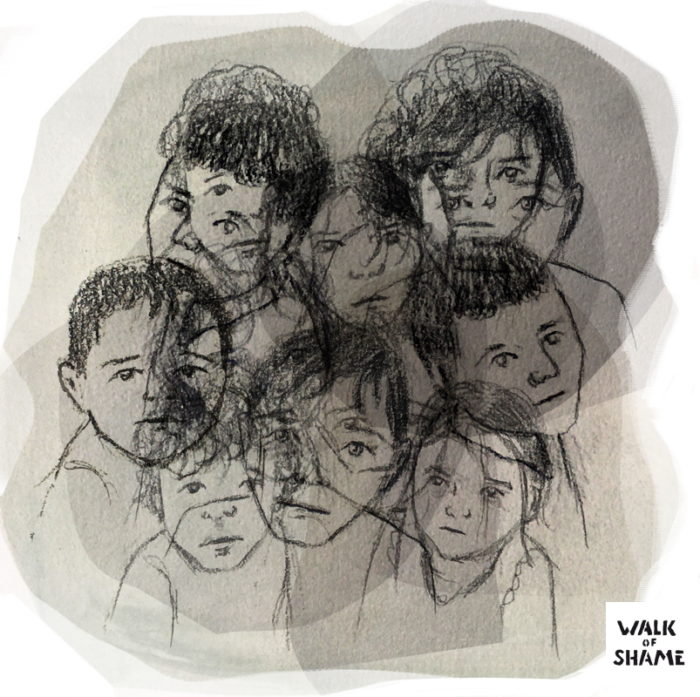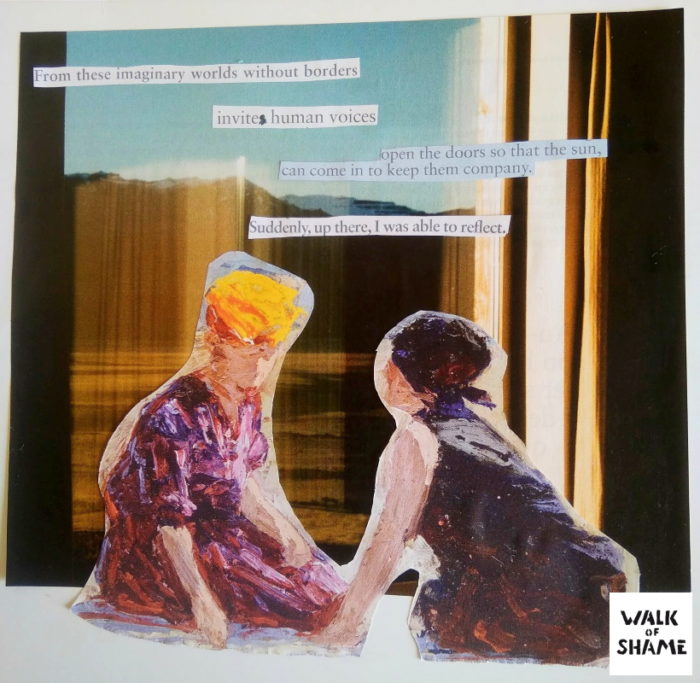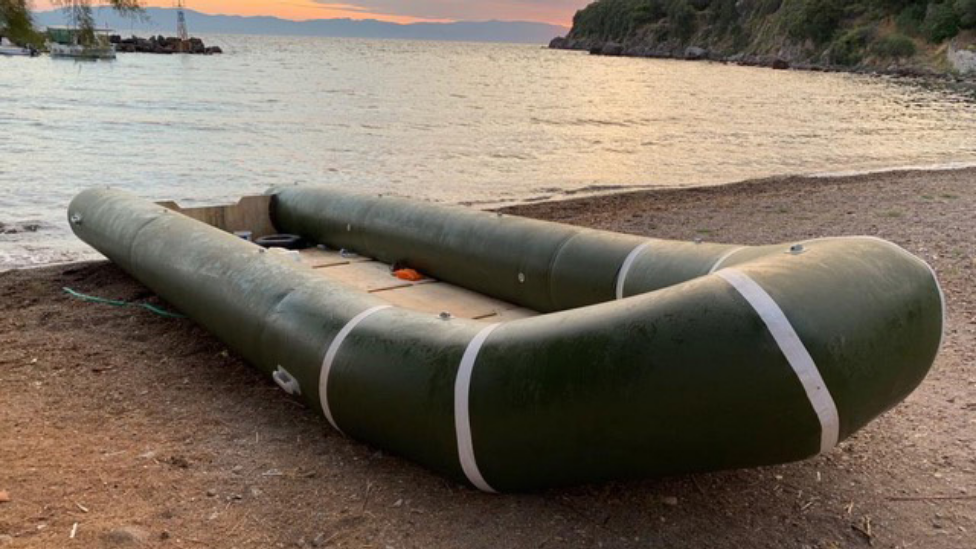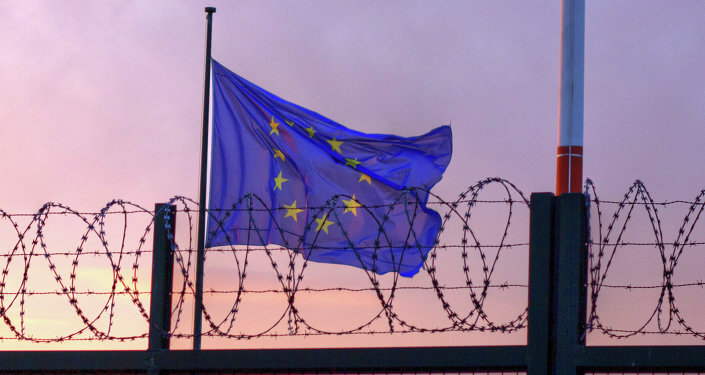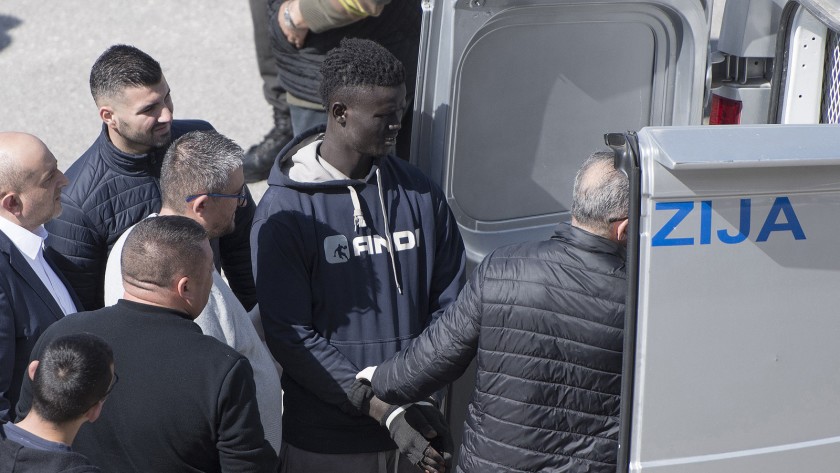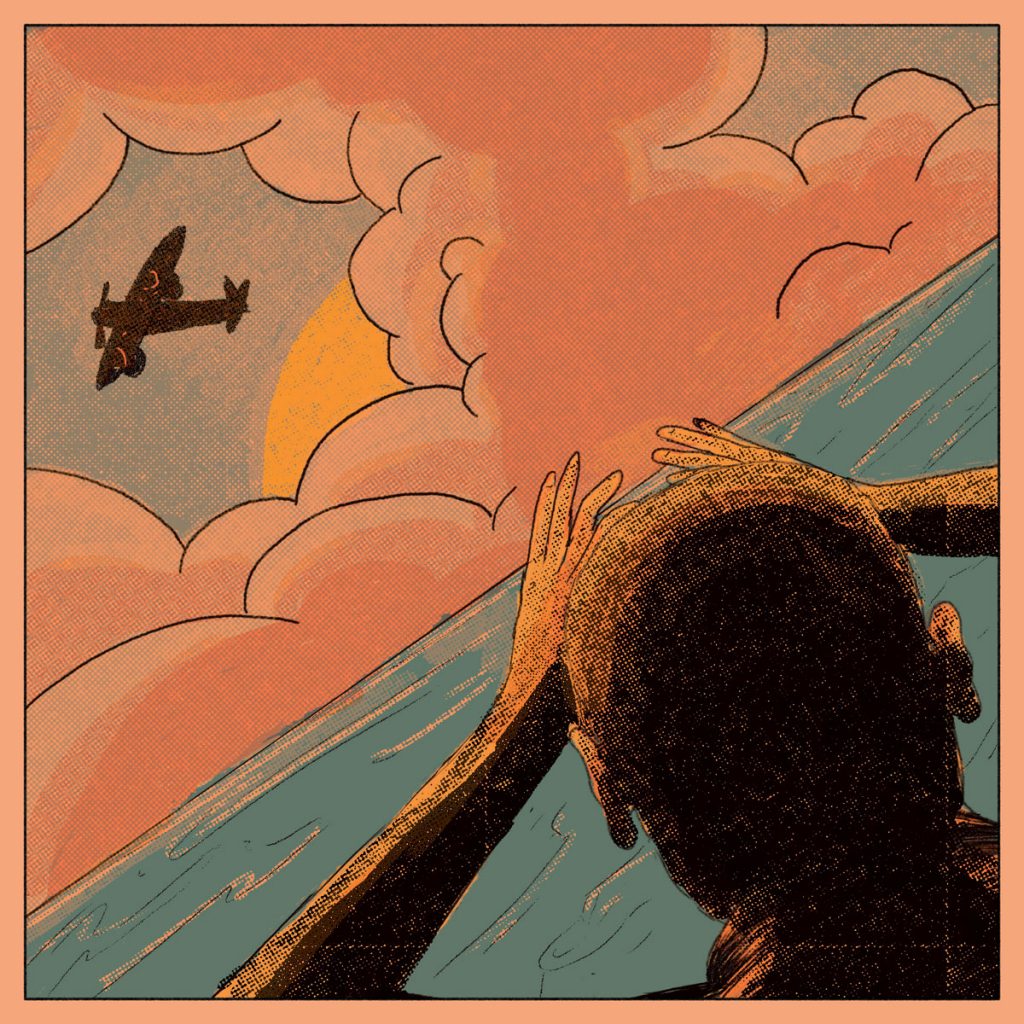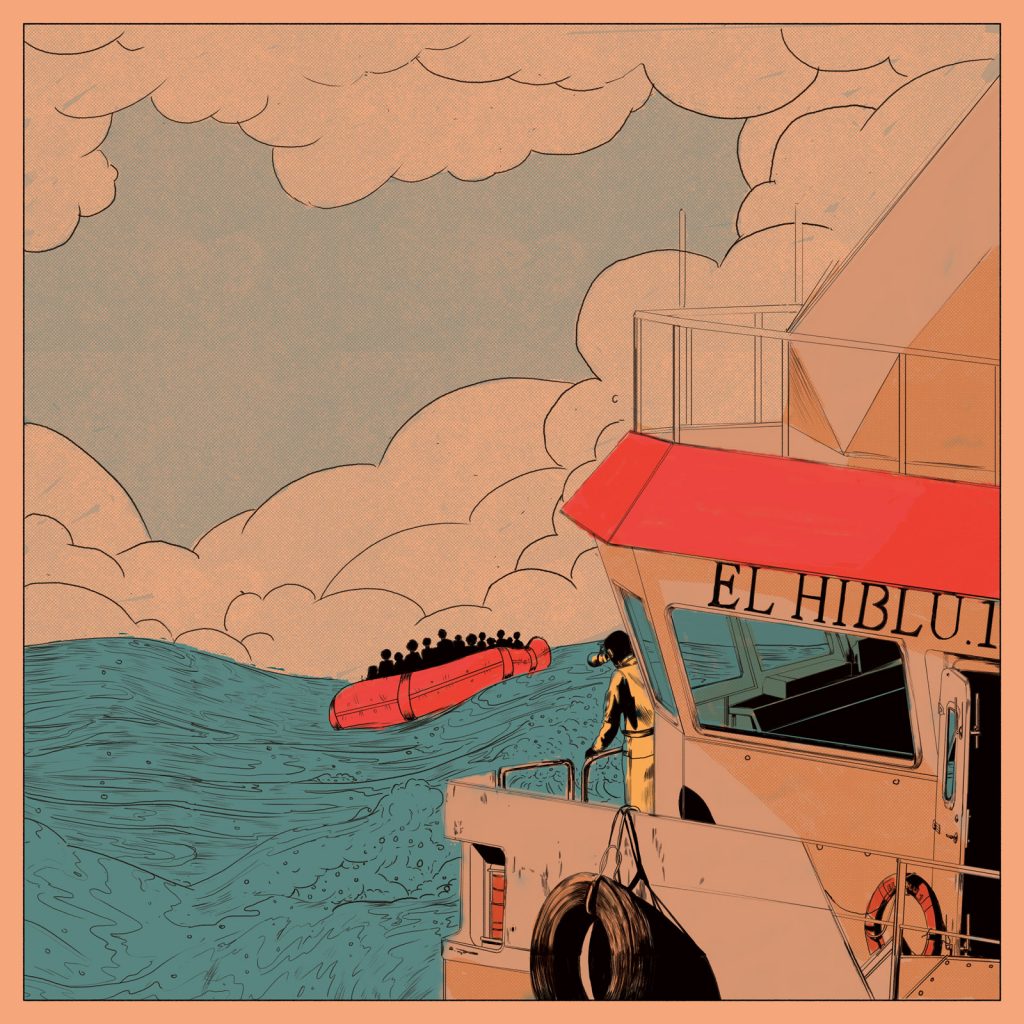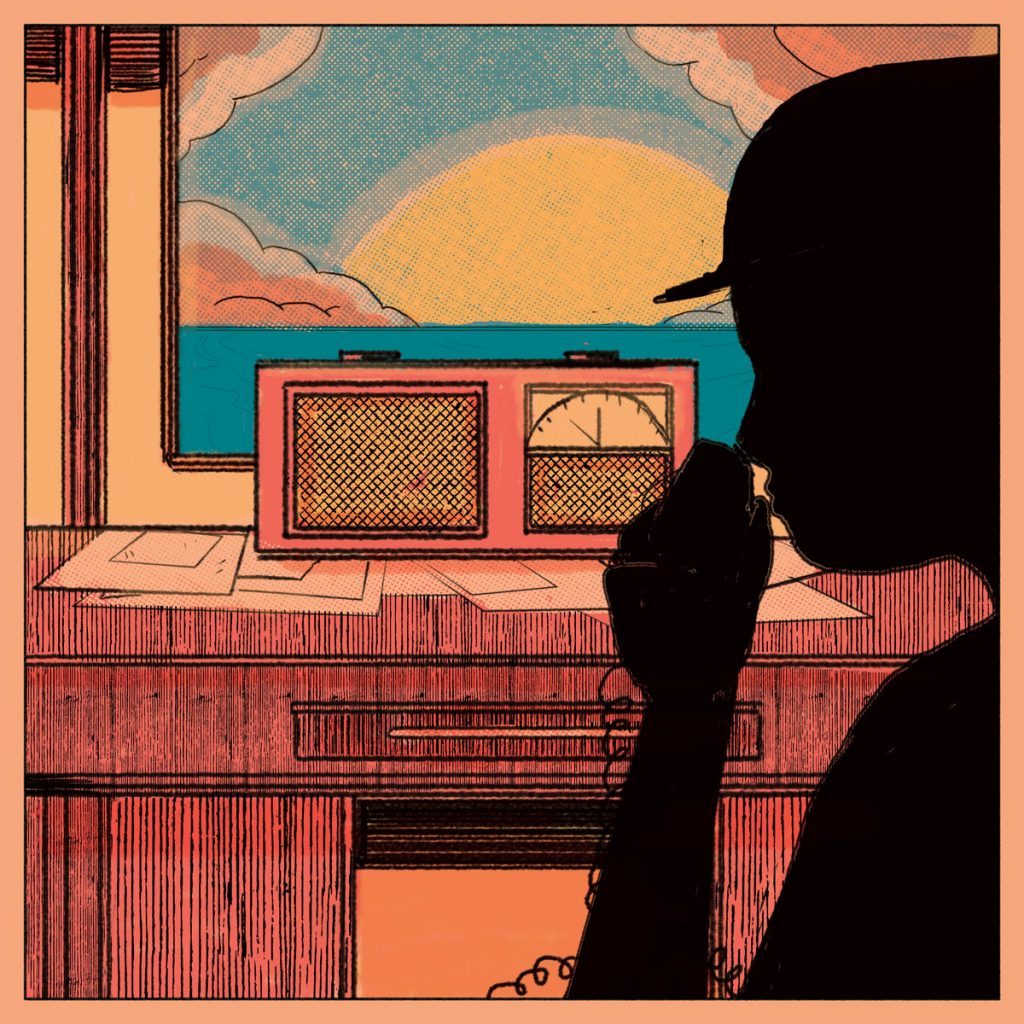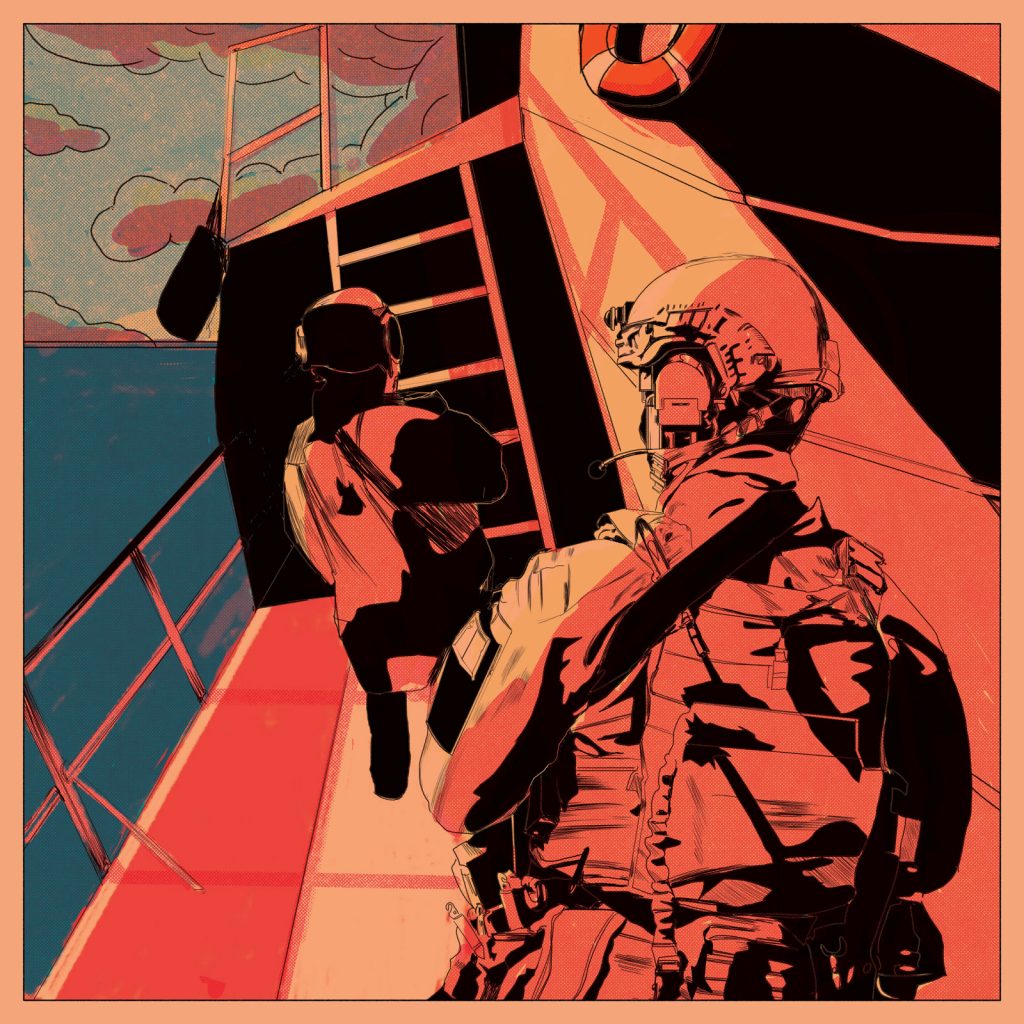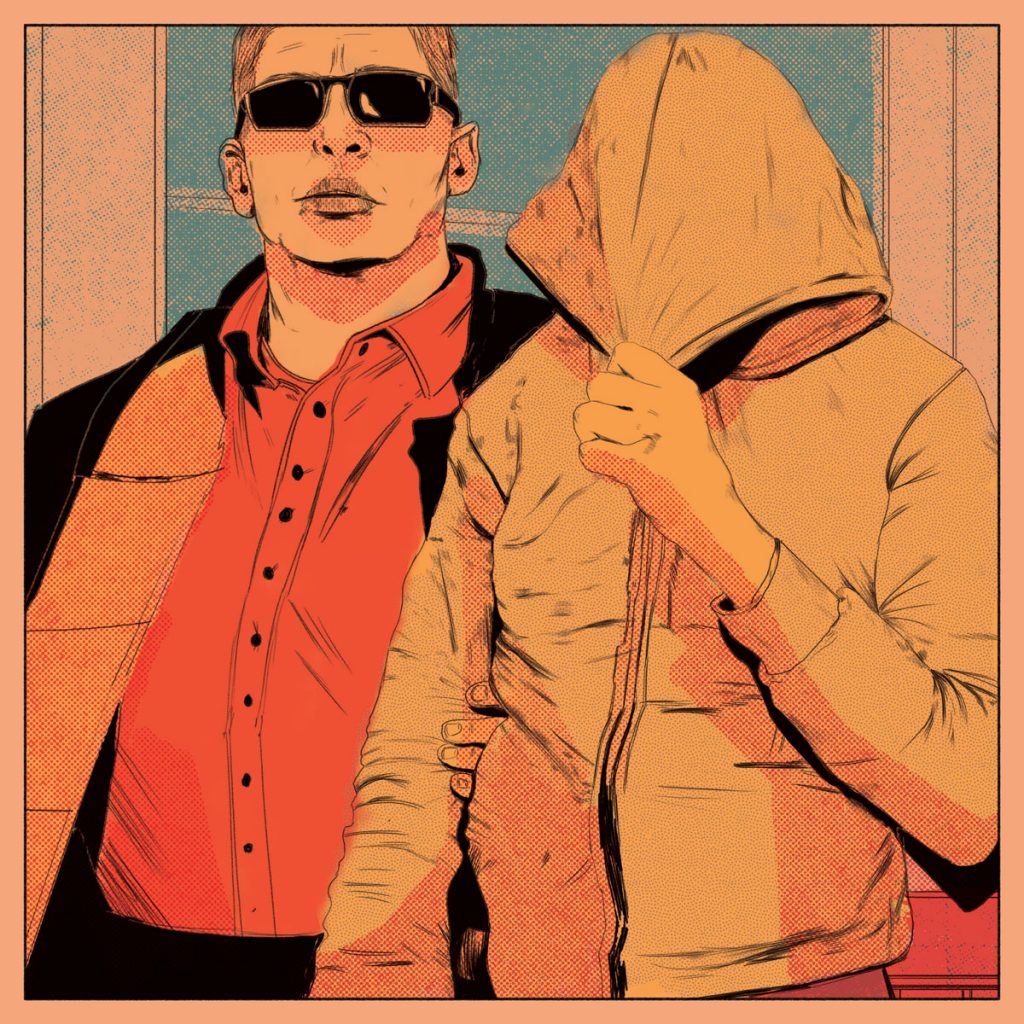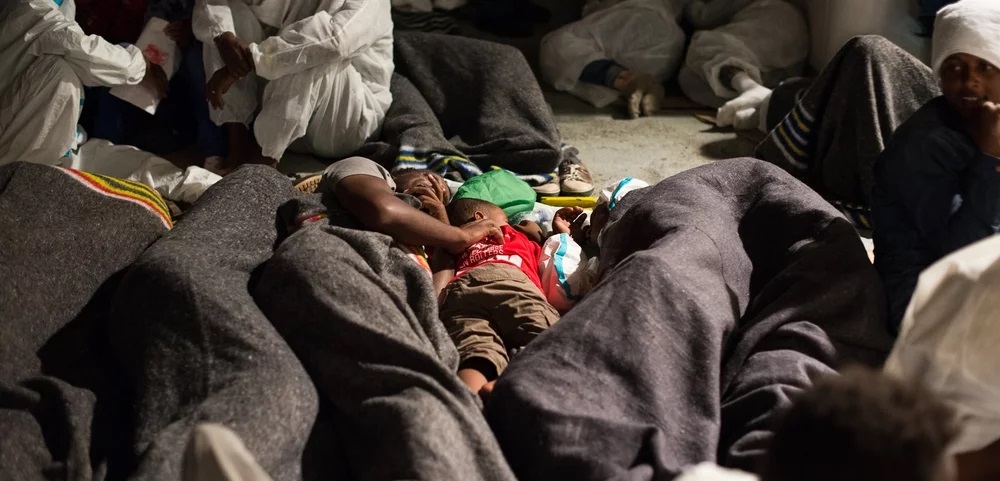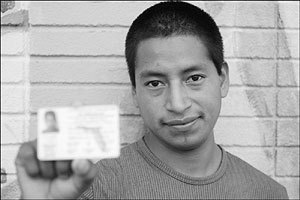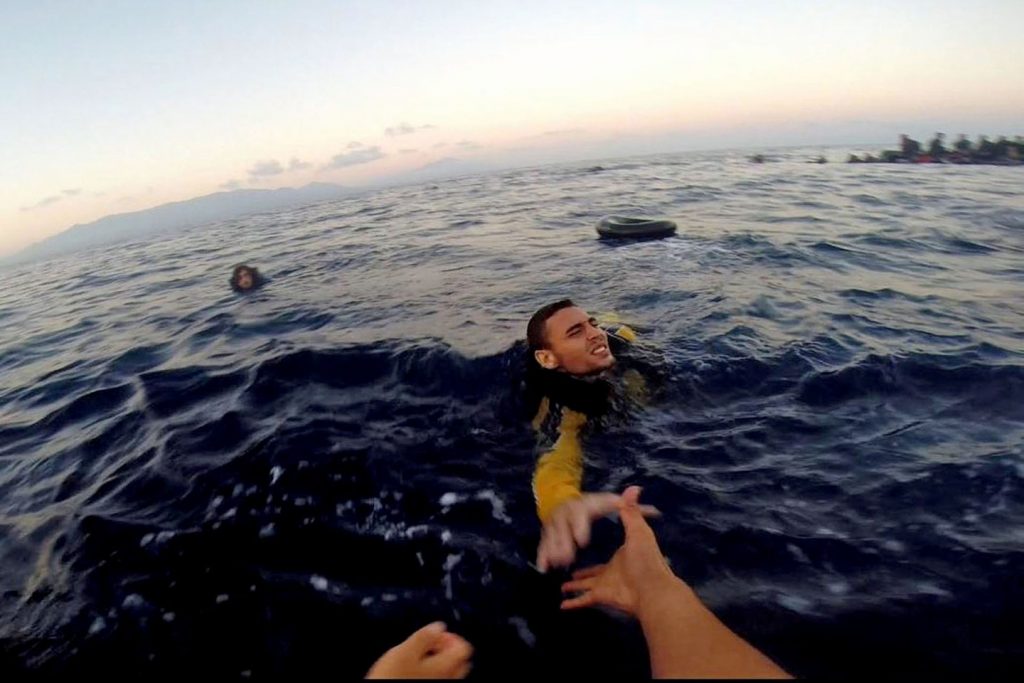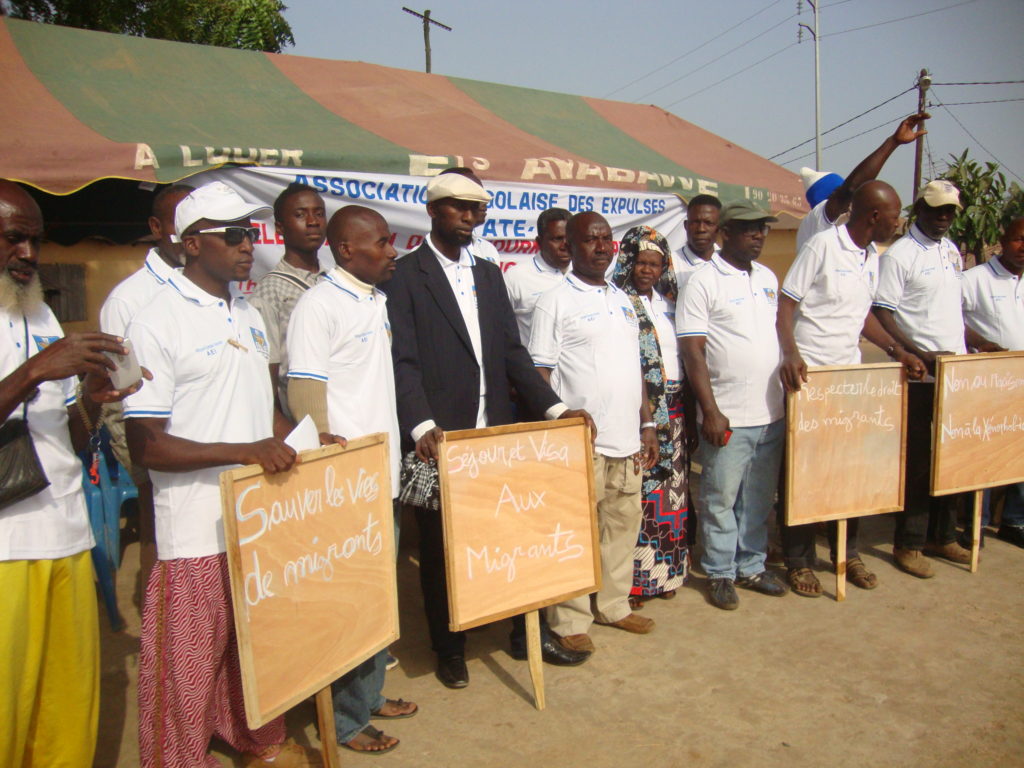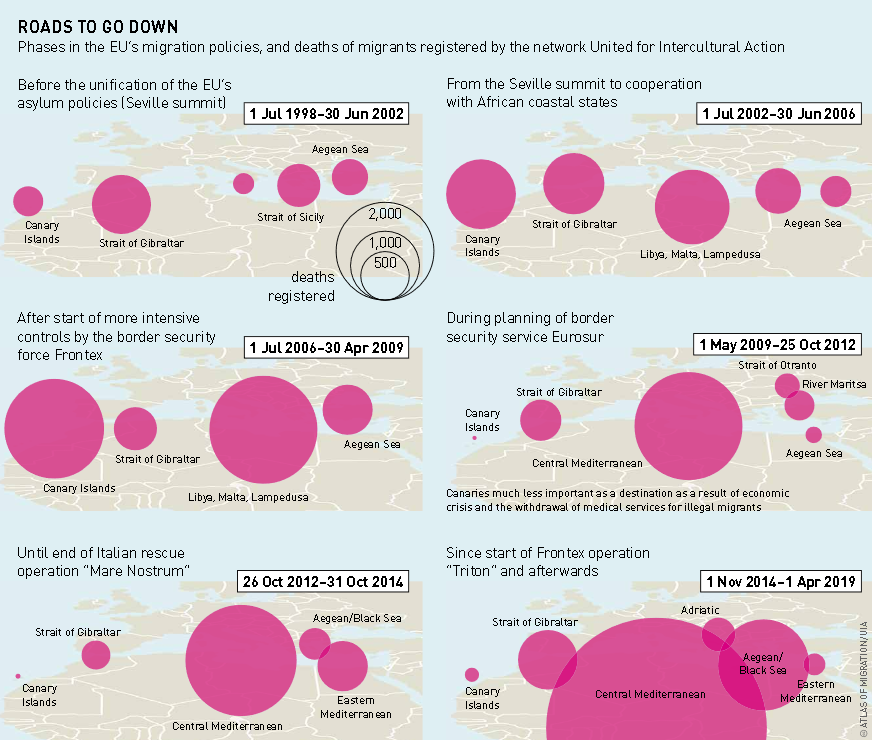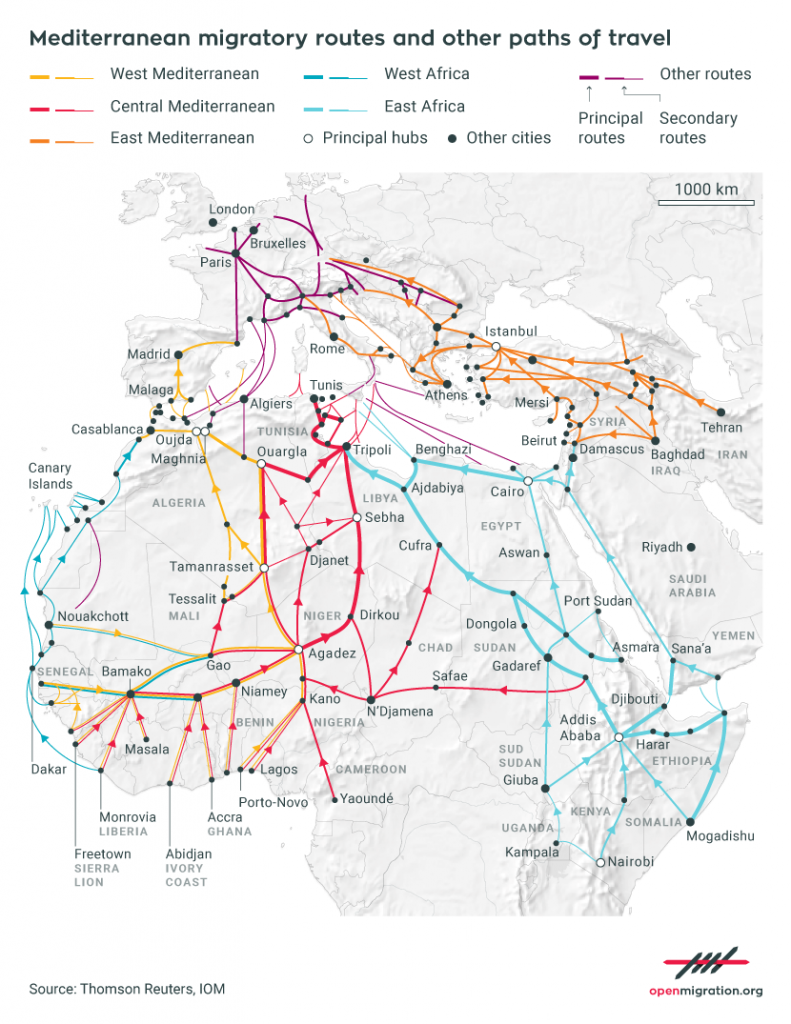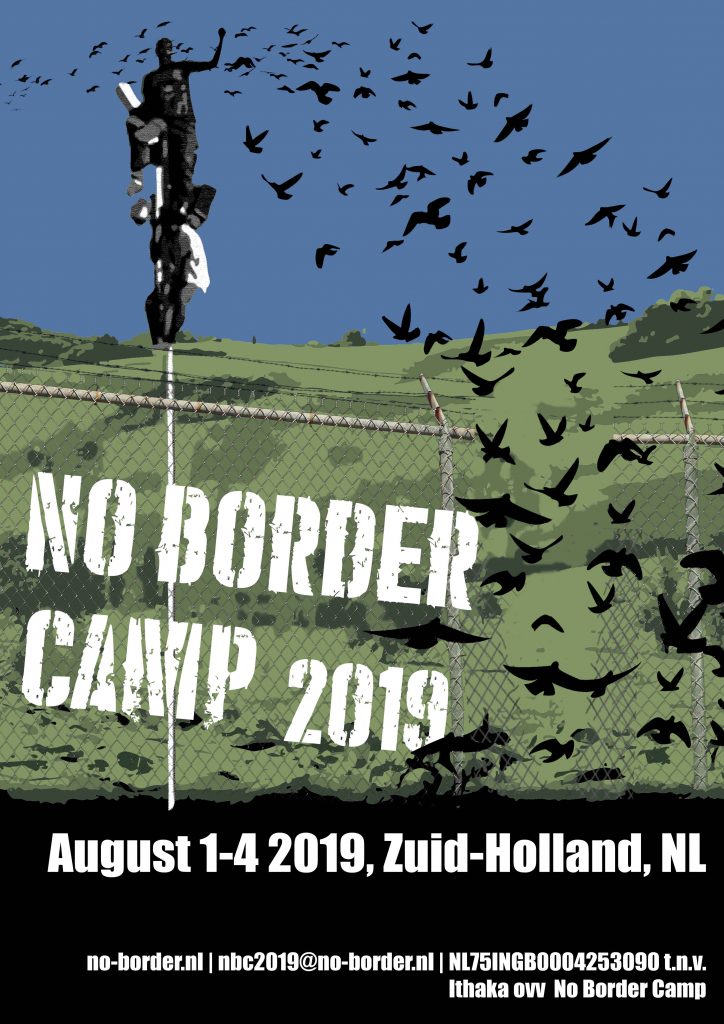Joint Statement calling for the dismissal of UNHCR’s special envoy Vincent Cochetel
On Tuesday, 6 September 2022, while families of the disappeared and deceased at EU borders came together for a protest action in Zarzis, Tunisia, Vincent Cochetel, the UNHCR’s special envoy for the Western and Central Mediterranean sent out a tweet:
“Grieving for the loss. But the same mothers had no problem encouraging or funding their children to embark on those dangerous journeys. Like in Senegal, symbolically prosecuting parents for putting at risk their children could trigger serious attitudinal change on death journeys.”Blaming mourning mothers, some of whom have searched for answers for over a decade, and even calling for their criminalisation through ‘symbolic prosecution’ is simply outrageous. In this joint statement, we want to denounce Mr Cochetel’s words in the strongest of terms. Mr Cochetel sent his tweet as a response to a ‘CommemorAction’, a large gathering in Zarzis that brought together the families of the disappeared, local fishermen, as well as activists from Africa and Europe. While the mothers, who are deeply traumatised, were publicly demanding answers, Mr Cochetel insulted them by making them responsible for their sons’ disappearance.
Grieving for the loss. But the same mothers had no problem encouraging or funding their children to embark on those dangerous journeys. Like in Senegal, symbolically prosecuting parents for putting at risk their children could trigger serious attitudinal change on death journeys. https://t.co/lRAwT4MRWA
— vincent cochetel (@cochetel) September 6, 2022
Some of the mothers and sisters of the disappeared have responded to Mr Cochetel:
Jalila Taamallah (mother): It is the visa and border system that has put migrants in danger, not their mothers. It is the fault of migration policies that cause the deaths of people crossing the Mediterranean. Therefore we will continue to participate in the demonstrations for freedom of movement. You can’t kill our demand for truth and justice.
Hajer Ayachi (mother): It should be a shame to accuse mothers and sisters of missing migrants who have lost their loved ones of being responsible for their deaths. We have been fighting against governments since 2011 to show that it is migration policies that endanger the lives of our sons, not us. Every time the authorities deny their responsibility our sons die for a second time.
Gamra Chaieb (mother): We, the mothers of the disappeared, consider it a great shame that we are given the responsibility for the death of our sons. Our sons are victims and so are we, without any response from the governments and the visa system. They are the criminals, they pushed our sons to leave because they were in misery and then they abandoned us. My son left because he was sick with cancer. He just wanted to get well and live for his family and his little daughter.
Samia Jabloun (mother): I believe that this man is sick because never a mother pushes her son to immigrate. He is not humanitarian, he does not feel our pain, the policies of the “third world countries” are responsible and also the European Union which takes advantage of the wealth of these countries and makes them poor, for this reason the young people are unemployed, the poverty which pushes them to immigrate to improve their standard of living.
Awatef Daoudi (mother): If our children go to sea it is to do good to their families because in their country they are badly treated and badly paid and there is always segregation. Those who have money have the power and can do whatever they want even for visas, these are the businessmen and politicians, but most of the young people do not have rights and that is why they throw themselves into the water. In both cases, either at sea or in their country, they are dead. But unfortunately it is a shame that our government does not want to keep our young people well.
Nourhene Khenissi (sister): Before attacking the mothers of the disappeared, it would have been better if you had criticised the Tunisian and Italian states, especially the European Union, because it is the first and last cause of all these tragedies. And know that freedom of movement and travelling is a right for every human being.
Besbes Sarra (sister): It’s not true what he wrote about the mothers of the missing migrants, there are no families who throw their sons into the sea which represents hell and danger. So you don’t have the right to judge the feelings of the family because the relationship between the mother and her son is not just a word but it is more than that. You have to know that especially the relationship between all the members of the family is intimate because the son for the mother replaces the father, for the sister the brother represents the second father and all the supports of life, for the father the son represents the person who is the first responsible for the family during his absence and for the brother he is the help and the power. Finally, it is important to know that if a member of the family is absent, the whole family will be devastated.
Rania Abdeltif (sister): The mother will not put her son in danger, on the contrary, the mother wants her son to always be by her side, but the young people did not have a chance in their country, so they decided to emigrate to improve the life of their family. The mothers will never abandon their children, they are now fighting for their missing children. The feeling of a mother or sister losing her son or brother is a very painful feeling that no one will understand unless they live it.Instead of blaming the EU border and visa regime, instead of denouncing the deadly migration policies of Europe, Mr Cochetel chose to blame the victims, turning them into perpetrators. This is unbearable and we are astonished: how can such a person remain in the position of a high-level official at the UNHCR?
We acknowledge that Mr Cochetel has apologised and we also appreciate that the UNHCR has apologised for the statement of their special envoy. Nonetheless, and not least as Mr Cochetel has made unacceptable remarks already in the past, we believe that this is not enough. We call on the UNHCR to take action and to dismiss their special envoy or for Mr Cochetel to resign.
Importantly, we believe that the UN agency’s problems are not solved through the dismissal of an individual. The UNHCR as a whole has deep institutional flaws and has time and again failed those it claims to protect. The behaviour of the UNHCR toward vulnerable groups in places such as Libya and Tunisia, and the appalling response of their staff to refugee protests there, highlight some of the many severe shortcomings of this UN agency.
Déclaration
Mères / parents et familles des disparus Marocains
Les mères de famille, et les amis des personnes disparues candidates à la migration informel ont reçu avec une grande surprise et un grand regret le tweet déclaration du 6 septembre de M. Vincent Cochetel, le Rapporteur spécial des Nations Unies sur les migrations. Méditerranée central et occidental , de tenir les mères responsables des tragédies des noyés et des disparus en mer, au lieu de critiquer et de blâmer son institution Le HCR et d’autres institutions telles que l’Organisation internationale pour les migrations (OIM), et de parler de leurs démarches discriminatoires et racistes pour ces institutions, qui ont été démontrées par la crise ukrainienne et qui ont n’a pas le courage de condamner les politiques européennes meurtrières, a lancé des accusations contre les familles dans un geste étrange du genre.
Cette déclaration indique que le respect du droit international et international humanitaire n’existe pas dans son dictionnaire, car il représente une instance internationale dans laquelle les droits de l’homme sont censés être respectés, et qui tant vers ces déclarations pour criminaliser les mères et les familles, et pour légitimer le comportement des pays du Sud à l’égard du ce dossier des disparus, ainsi les pays du Nord, dont l’Europe, fuient ses responsabilités morales et politique à l’égard de ce dossier résultant des politiques européennes téméraires et meurtrières, légitimant l’externalisation et militarisation des frontières, en pompant encore des milliards d’euros pour équiper et armer l’Agence européenne Frontex, cette agence dont les violations et les crimes ne vous sont pas cachés, alors que les mères vous semblaient le petit mur auquel vous accrochez un piquet à ces crimes.
La jeunesse perdue du Sud migre à la recherche de la liberté, de la dignité et de la justice qui lui étaient avortés dans son pays, et que la politique de votre institution n’a pas approuvée après avoir volé son rêve dans son pays en pillant les richesses, en appauvrissant les peuples, en alimentant guerres et conflits dans les pays du Sud, et établir un système injuste dans la liberté de circulation à travers l’ère du régime des visas injuste et inéquitable.
Ainsi, les mères, familles et amis des personnes disparues candidates à la migration informel au Maroc confirment ce qui suit :
- Condamnant ces déclarations, qui touchent aux sentiments et aux sentiments d’injustice que nous ressentons après l’absence de nos proches, même si l’élément d’excuse que vous avez présenté ne cachera pas que vous ne serez jamais partisan des questions de droits de l’homme les plus simples et que votre naturel la position est simplement sur la touche.
- Cessation immédiate de la duplicité et de l’hypocrisie de vous et de vos institutions, ce qui a été confirmé par la crise ukrainienne.
- Les mères de famille, et les amis des personnes disparues, candidates à la migration informel et bloquées aux frontières, ont insisté pour savoir, clarifier la vérité, rendre justice et révéler le sort de ceux qui ont disparu à la lumière de ces politiques et frontières meurtrières .
- Appelant les organisations et réseaux de défense des droits humains à condamner ces propos honteux et racistes,
- Le fait que ces déclarations honteuses à notre encontre ne feront qu’augmenter la détermination et lutte des mères des familles, et des amis des disparus et leur détermination à lutter pour la connaissance et l’élucidation de la vérité sur le sort de leurs enfants et la justice. des politiques d’immigration meurtrières et nous renouvelons notre soutien aux luttes, à la lutte et à la fermeté des mères de famille, des familles et des amis des disparus dans les pays d’Amérique centrale.
Et notre lutte continue pour que nos enfants révèlent toute la vérité et justice.
- Groupe des disparus Marocains 2002.
- Collectifs des mères des disparus Marocains en Libye 2017-2018-2019.
- Collectif des jeunes Marocains bloqués et détenus en Libye.
- Collectifs des familles des disparus Marocains en Algérie.
- Groupe de travail sur la disparition Association d’aide des migrants Maroc.
- Collectifs des mers et parents des disparus en méditerranée 2018 au 2022.
- Collectifs des mères des disparus en Atlantique 2020/2021/2022.
